Registration Convention
| Convention on Registration of Objects Launched into Outer Space | |
|---|---|
| Signed | 12 November 1974 |
| Location | New York City, New York, United States |
| Effective | 15 September 1976 |
| Condition | 5 ratifications |
| Signatories | 25 |
| Parties | 63 |
| Depositary | Secretary-General of the United Nations |
| Languages | Arabic, Chinese, English, French, Russian and Spanish |
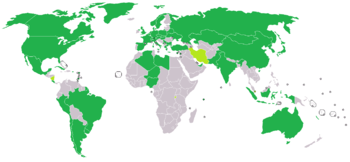
The Convention on Registration of Objects Launched into Outer Space (commonly known as the Registration Convention) was adopted by the United Nations General Assembly in 1974[1][2] and went into force in 1976. As of November 2016, it has been ratified by 63 states.[3]
The convention requires states to furnish to the United Nations with details about the orbit of each space object. A registry of launchings was already being maintained by the United Nations as a result of a General Assembly Resolution in 1962.[4][5]
The Registration Convention and four other space law treaties are administered by the United Nations Committee on the Peaceful Uses of Outer Space.
The European Space Agency and European Organization for the Exploitation of Meteorological Satellites have submitted declarations of acceptance of rights and obligations according to the convention.[6]
Current status
The register is kept by the United Nations Office for Outer Space Affairs (UNOOSA) and includes[7]
- Name of launching State
- An appropriate designator of the space object or its registration number
- Date and territory or location of launch
- Basic orbital parameters (Nodal period, Inclination, Apogee and Perigee)
- General function of the space object
Information on registered objects is available at the UNOOSA site
List of states parties
There are currently 63 states parties to the Convention.[8]
| State party | Signed | Deposited | Entered into force |
|---|---|---|---|
| |
— | 9 March 2007 | 9 March 2007 |
| |
— | 13 December 1988 | 13 December 1988 |
| |
26 March 1975 | 5 May 1993 | 5 May 1993 |
| |
— | 11 March 1986 | 11 March 1986 |
| |
14 October 1975 | 6 March 1980 | 6 March 1980 |
| |
30 June 1975 | 26 January 1978 | 26 January 1978 |
| |
30 June 1975 | 24 February 1977 | 24 February 1977 |
| |
— | 17 March 2006 | 17 March 2006 |
| |
4 February 1976 | 11 May 1976 | 15 September 1976 |
| |
14 February 1975 | 4 August 1976 | 15 September 1976 |
| |
— | 17 September 1981 | 17 September 1981 |
| |
— | 17 September 1981 | 17 September 1981 |
| |
— | 10 January 2014 | 10 January 2014 |
| |
— | 14 October 2010 | 14 October 2010 |
| |
— | 10 April 1978 | 10 April 1978 |
| |
— | 6 July 1978 | 6 July 1978 |
| |
— | 22 February 1993 | 22 February 1993 |
| |
12 December 1975 | 1 April 1977 | 1 April 1977 |
| |
14 January 1975 | 17 December 1975 | 15 September 1976 |
| |
2 March 1976 | 16 October 1979 | 16 October 1979 |
| |
— | 27 May 2003 | 27 May 2003 |
| |
13 October 1975 | 26 October 1977 | 26 October 1977 |
| |
— | 18 January 1982 | 18 January 1982 |
| |
— | 16 July 1997 | 16 July 1997 |
| |
— | 8 December 2005 | 8 December 2005 |
| |
— | 20 June 1983 | 20 June 1983 |
| |
— | 11 January 2001 | 11 January 2001 |
| |
— | 10 March 2009 | 10 March 2009 |
| |
— | 14 October 1981 | 14 October 1981 |
| |
— | 28 April 2014 | 28 April 2014 |
| |
— | 28 April 2004 | 28 April 2004 |
| |
— | 8 January 2010 | 8 January 2010 |
| |
— | 26 February 1999 | 26 February 1999 |
| |
— | 8 March 2013 | 8 March 2013 |
| |
19 December 1975 | 1 March 1977 | 1 March 1977 |
| |
30 October 1975 | 10 April 1985 | 10 April 1985 |
| |
— | 23 October 2006 | 23 October 2006 |
| |
— | 19 September 2012 | 19 September 2012 |
| |
— | 26 January 1981 | 26 January 1981 |
| |
5 August 1976 | 22 December 1976 | 22 December 1976 |
| |
— | 6 July 2009 | 6 July 2009 |
| |
— | 28 June 1995 | 28 June 1995 |
| |
1 December 1975 | 27 February 1986 | 27 February 1986 |
| |
— | 21 March 1979 | 21 March 1979 |
| |
4 December 1975 | 22 November 1978 | 22 November 1978 |
| |
— | 14 March 2012 | 14 March 2012 |
| |
17 June 1975 | 13 January 1978 | 13 January 1978 |
| |
— | 18 July 2012 | 18 July 2012 |
| |
— | 12 March 2001 | 12 March 2001 |
| |
— | 28 December 1977 | 28 December 1977 |
| |
— | 28 May 1993 | 28 May 1993 |
| |
— | 27 January 2012 | 27 January 2012 |
| |
— | 20 December 1978 | 20 December 1978 |
| |
— | 27 April 1999 | 27 April 1999 |
| |
9 June 1976 | 9 June 1976 | 15 September 1976 |
| |
14 April 1975 | 15 February 1978 | 15 February 1978 |
| |
— | 21 June 2006 | 21 June 2006 |
| |
11 July 1975 | 14 September 1977 | 14 September 1977 |
| |
— | 7 November 2000 | 7 November 2000 |
| |
6 May 1975 | 30 March 1978 | 30 March 1978 |
| |
24 January 1975 | 15 September 1976 | 15 September 1976 |
| |
— | 18 August 1977 | 18 August 1977 |
| |
— | 3 November 2016 | 3 November 2016 |
Signatories that are not parties
There are four states which have signed, but not ratified, the Convention.[8]
| State | Signed |
|---|---|
| |
13 November 1975 |
| |
27 May 1975 |
| |
13 May 1975 |
| |
31 August 1976 |
Proposals
A General Assembly resolution from December 2007 that was accepted by consensus recommended that the data should be extended to include:[9]
- Coordinated Universal Time as the time reference for the date of launch;
- Kilometres, minutes and degrees as the standard units for basic orbital parameters;
- Any useful information relating to the function of the space object in addition to the general function requested by the Registration Convention
- The geostationary orbit location, if appropriate
- Any change of status in operations (e.g., when a space object is no longer functional)
- The approximate date of decay or re-entry
- The date and physical conditions of moving a space object to a disposal orbit
- Web links to official information on space objects
Background
As of 2008, more than 200 dead satellites littered the part of space near geostationary orbit. Within 10 years, that number could increase fivefold, warns a report by the UN. The resulting chaos could lead to serious damage or loss of a spacecraft.[10]
Notes
- ↑ Belarus signed and ratified the Convention as the
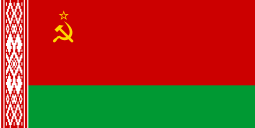 Byelorussian SSR, which was a republic within the Soviet Union. The current Belarusian state did not begin to exist until after the dissolution of the Soviet Union on 26 December 1991.
Byelorussian SSR, which was a republic within the Soviet Union. The current Belarusian state did not begin to exist until after the dissolution of the Soviet Union on 26 December 1991. - 1 2 On 30 March 1978, the United Kingdom declared that the Convention applied to all its territories, including Hong Kong, whose sovereignty was transferred to China on 1 July 1997. China filed a declaration that upon the transfer, the Convention would continue to apply to Hong Kong.
- 1 2 Turkey filed a statement when it acceded to the Convention which implicitly stated that it did not intend for the Convention to be in force with Cyprus. Cyprus objected to the declaration on 21 June 2007 and stated that it would recognize the Convention as being in force with Turkey.
- 1 2
 Czechoslovakia signed the Convention on 5 April 1976 and ratified it on 26 July 1977, which was also the date it entered into force for Czechoslovakia. Czechoslovakia dissolved into the Czech Republic and Slovakia on 31 December 1992.
Czechoslovakia signed the Convention on 5 April 1976 and ratified it on 26 July 1977, which was also the date it entered into force for Czechoslovakia. Czechoslovakia dissolved into the Czech Republic and Slovakia on 31 December 1992. - ↑
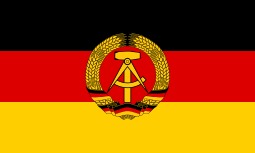 East Germany signed the Convention on 27 August 1975 and ratified it on 12 May 1977, which was also the date it entered into force for East Germany. East Germany was absorbed by West Germany (the current German state) on 3 October 1990.
East Germany signed the Convention on 27 August 1975 and ratified it on 12 May 1977, which was also the date it entered into force for East Germany. East Germany was absorbed by West Germany (the current German state) on 3 October 1990. - 1 2
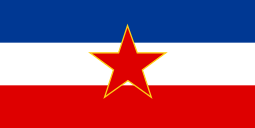 Yugoslavia acceded to the Convention on 24 February 1978, which was also the date it entered into force for Yugoslavia. Yugoslavia has since dissolved. Serbia is the successor state to
Yugoslavia acceded to the Convention on 24 February 1978, which was also the date it entered into force for Yugoslavia. Yugoslavia has since dissolved. Serbia is the successor state to 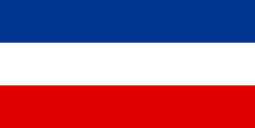 Serbia and Montenegro.
Serbia and Montenegro. - ↑ Russia is the successor state to the
 Soviet Union
Soviet Union - ↑ Ukraine signed and ratified the Convention as the
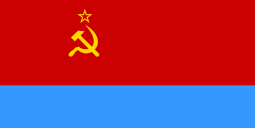 Ukrainian SSR, which was a republic within the Soviet Union. The current Ukrainian state did not begin to exist until after the dissolution of the Soviet Union on 26 December 1991.
Ukrainian SSR, which was a republic within the Soviet Union. The current Ukrainian state did not begin to exist until after the dissolution of the Soviet Union on 26 December 1991.
References
- ↑ United Nations General Assembly Session 29 Resolution 3235. Convention on Registration of Objects Launched Into Outer Space A/RES/3235(XXIX) 12 November 1974. Retrieved 2008-03-13.
- ↑ "Resolution 3235 (XXIX) - Convention on Registration of Objects Launched Into Outer Space". UNOOSA. 12 November 1974.
- ↑ http://treaties.un.org/doc/Publication/CN/2013/CN.181.2013-Eng.pdf
- ↑ United Nations General Assembly Session 16 Resolution 1721. International co-operation in the peaceful uses of outer space A/RES/1721(XVI) 20 December 1962. Retrieved 2008-03-13.
- ↑ "1721 (XVI) - International Cooperation in the peaceful uses of outer space". 20 December 1962.
- ↑ Status of International Agreements relating to activities in outer space as at 1 January 2012
- ↑ "Convention on Registration of Objects Launched into Outer Space". UNOOSA. Retrieved 2009-04-06.
- 1 2 "Convention on registration of objects launched into outer space". United Nations Treaty Collection. 2014-08-14. Retrieved 2014-08-14.
- ↑ United Nations General Assembly Session 62 Resolution 101. A/RES/62/101 page 3. 17 December 2007. Retrieved 2008-03-13.
- ↑ McKie, Robin (24 February 2008). "Warning of catastrophe from mass of 'space junk' - 'Failure to act would be folly,' says report to UN". London: The Observer. Retrieved 22 May 2010.